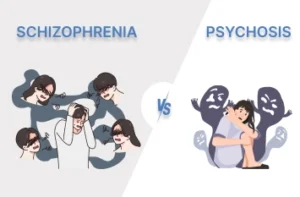
Delusion VS Hallucination Understanding the Crucial Differences
Delusion VS Hallucination Understanding the Crucial Differences Get Instant Relief Now! In mental health, the terms “delusion” and “hallucination” often create confusion due to their

Schizophrenia is a complex and chronic mental disorder characterized by a range of symptoms including hallucinations, delusions, disorganized thinking, and impairments in cognitive function and social interactions. It affects about 1% of the global population, typically manifesting in late adolescence or early adulthood.
While the exact cause of schizophrenia remains elusive, research suggests a combination of genetic, environmental, and neurobiological factors contributing to its development. Recent studies have shed light on the role of genetics in schizophrenia, with genome-wide association studies (GWAS) identifying specific genetic variations associated with an increased risk of the disorder.
For instance, a study published in the journal Nature Neuroscience found that variations in a gene called C4, involved in immune system function, may contribute to the development of schizophrenia.
Despite the often negative perception surrounding schizophrenia, there are aspects of the disorder that can be viewed in a positive light. Individuals with schizophrenia may possess unique perspectives and creativity. Research has shown that some people with schizophrenia exhibit heightened artistic abilities and innovative thinking.
For example, renowned mathematician John Nash, subject of the biographical film “A Beautiful Mind,” famously battled schizophrenia while making groundbreaking contributions to game theory.
Additionally, some individuals with schizophrenia demonstrate resilience and strength in coping with their symptoms and managing daily challenges. By highlighting these positive aspects, we can foster a more compassionate and understanding attitude towards individuals living with schizophrenia.
Individuals diagnosed with schizophrenia can indeed experience joy and a range of other emotions. Despite the often debilitating symptoms associated with the disorder, such as hallucinations and delusions, people with schizophrenia are still capable of experiencing positive emotions like happiness and pleasure.
However, the intensity and frequency of these emotions may vary depending on factors such as the severity of their symptoms, the effectiveness of their treatment, and their overall support network. It’s essential to recognize that while schizophrenia can present significant challenges, it does not diminish a person’s capacity for joy and fulfillment in life.
With appropriate treatment and support, individuals with schizophrenia can find moments of happiness and contentment just like anyone else.
Schizophrenia is a complex mental disorder that affects approximately 1% of the global population. Despite its prevalence, there are still many misconceptions surrounding this condition. Here are ten interesting facts about schizophrenia that shed light on its nature and impact:
1.Schizophrenia is not the same as multiple personality disorder:
Despite popular belief, schizophrenia is distinct from multiple personality disorder, formally known as dissociative identity disorder. While both involve altered perceptions of reality, schizophrenia primarily manifests as disruptions in thought processes, perception, and behavior.
2.Early intervention is crucial:
Research suggests that early detection and intervention can significantly improve outcomes for individuals with schizophrenia. Prompt diagnosis and appropriate treatment can help manage symptoms and prevent complications associated with the disorder.
3.Genetic predisposition plays a role:
While the precise cause of schizophrenia remains unknown, genetics is believed to play a significant role. Individuals with a family history of schizophrenia have a higher risk of developing the disorder, indicating a genetic predisposition.
4.Environmental factors contribute:
In addition to genetic factors, environmental influences also contribute to the development of schizophrenia. Prenatal exposure to certain viruses, maternal stress during pregnancy, and childhood trauma are among the environmental factors implicated in schizophrenia risk.
5.Symptoms vary widely:
Schizophrenia encompasses a broad spectrum of symptoms that can vary in severity and presentation among individuals. Common symptoms include hallucinations, delusions, disorganized thinking, and impaired cognitive function.
6.Positive and negative symptoms:
Symptoms of schizophrenia are often categorized as positive or negative. Positive symptoms involve the presence of abnormal behaviors or experiences, such as hallucinations and delusions, while negative symptoms refer to deficits in normal behaviors, such as reduced emotional expression and social withdrawal.
7.Treatment options are available:
While there is no cure for schizophrenia, various treatment modalities can help manage symptoms and improve quality of life. Antipsychotic medications, psychotherapy, and psychosocial interventions are commonly used in schizophrenia treatment.
8.Stigma remains a barrier:
Despite advancements in understanding and treating schizophrenia, stigma and discrimination against individuals with the disorder persist. Stigmatizing attitudes can contribute to social isolation, reduced access to care, and poorer outcomes for people living with schizophrenia.
9.Substance abuse is common:
Individuals with schizophrenia are at increased risk of substance abuse, including alcohol and drugs. Substance abuse can exacerbate symptoms of schizophrenia and interfere with treatment effectiveness, highlighting the importance of addressing dual diagnosis in clinical care.
10.Recovery is possible:
With appropriate treatment and support, many individuals with schizophrenia can lead fulfilling and meaningful lives. While the journey to recovery may involve challenges and setbacks, recovery-oriented approaches focus on promoting empowerment, hope, and resilience for individuals living with schizophrenia.
Schizophrenia is a chronic mental health condition that can present significant challenges, many people with schizophrenia can achieve stability and function well in various aspects of life. With a combination of medication, therapy, social support, and lifestyle adjustments, individuals with schizophrenia can manage their symptoms effectively and pursue their goals and aspirations.
It is essential to recognize that recovery looks different for everyone, and success is not defined solely by conventional notions of “normalcy.” Instead, it’s about finding balance, resilience, and a sense of purpose despite the obstacles posed by the disorder.
With understanding, acceptance, and access to comprehensive care, individuals with schizophrenia can indeed live fulfilling and meaningful lives.
People with schizophrenia may or may not be aware that they have the disorder, depending on various factors such as the severity of their symptoms, insight into their condition, and access to information and support.
Insight, or awareness of illness, can fluctuate over time and may be influenced by factors such as the presence of psychotic symptoms, medication adherence, and social support. Some individuals with schizophrenia may recognize that they have a mental health condition and actively seek treatment and support, while others may lack insight into their symptoms and deny or minimize their experiences.
Additionally, the stigma surrounding mental illness can impact individuals’ willingness to acknowledge their condition openly. Overall, awareness of schizophrenia among affected individuals can vary widely, highlighting the importance of education, early intervention, and support services in promoting understanding and acceptance of the disorder.
Understanding the facts about schizophrenia is crucial for dispelling misconceptions and fostering empathy and support for those affected by this complex disorder. Despite its challenges, individuals with schizophrenia can lead fulfilling lives with the appropriate treatment and support. By raising awareness, promoting acceptance, and advocating for comprehensive care, we can create a more inclusive society where everyone has the opportunity to thrive.

Delusion VS Hallucination Understanding the Crucial Differences Get Instant Relief Now! In mental health, the terms “delusion” and “hallucination” often create confusion due to their

Schizophrenia VS Psychosis: How They are Different Get Instant Relief Now! Schizophrenia and psychosis frequently stir up confusion and concern, yet they represent very different

Depression is a serious mental illness that affects millions of people around the world…
